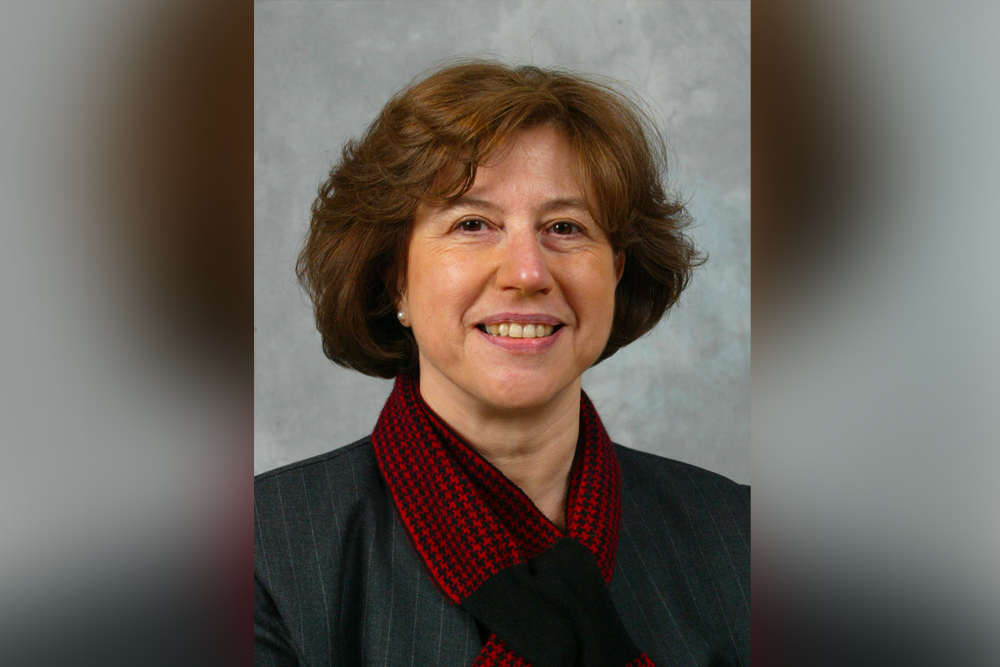Research Interests:
Transcription Factors/Nuclear receptors Epigenetic mechanisms of transcriptional regulation (chromatin modifications and non-coding RNAs) Epigenetics mechanisms of development and cancer Systems biologyAbout Nicoletta Sacchi
Biography:
Dr. Nicoletta Sacchi joined the Faculty of Roswell Park Comprehensive Cancer Center, Buffalo, NY, in 2003, as a Professor of Oncology and Distinguished Member of Genetics. After receiving a magna cum laude Doctoral Degree in Biological Sciences from the University of Milan (Italy) with a thesis dissertation in yeast genetics, she performed postdoctoral training in different fields of genetics (clinical genetics and prenatal diagnosis, somatic cell genetics, inborn errors of metabolism, immunogenetics and cancer genetics) at the University of Milan (Italy) and the Erasmus University of Rotterdam (The Netherlands). After a significant stage in the lab of the Nobel Laureate George Köhler at the Basel Institute of Immunology (Switzerland) working on mechanisms of antibody diversity involving also the peculiar DNA polymerase working without template, TdT, she chose to commit her efforts to cancer research, and moved to the USA. First at the Medical School (USUHS), Bethesda, and subsequently at the NCI (NIH) (Bethesda and Frederick, MD), she investigated whether in addition to direct derangement of oncogenes, also oncogene position effects and dosage effects play a pathogenic role in leukemogenesis. To this end, she used as models specific chromosome regions (e.g. the 11q23 and 21q22) both involved in many nonrandom leukemia chromosome rearrangements and associated with genetic disorders predisposing to cancer (e.g. ataxia telangiectasia and Down syndrome). This research entailed accurate quantitative analysis of gene transcription in rare and scanty patients’ samples at a time when there was no qPCR. This led her to develop together with Piotr Chomczynski, a rapid, efficient and inexpensive method known as the “Single Step Method for RNA isolation” (Anal Biochem, 1987; Nature Protocols, 2006). This method, based on the finding that RNA can be isolated from DNA based on the acidity of the medium, greatly facilitated her studies over the years, but also advanced RNA-based technologies and, in the recent years, also the isolation of non-coding RNAs. The original paper describing this method, which was, and still is, widely used by scientists around the world, ranked #5 among the 100 most cited papers on November 2014.
In the genome era she was part of an international group of scientists collaborating on the physical and linkage map of chromosome 21, the smallest human autosome, to accelerate the positional cloning of genes on chromosome 21 involved in many diseases (e.g. Core Binding Factor Leukemia (CBFL), Alzheimer disease, and Down syndrome). As a Faculty (Associate Professor, then Full Professor) at the University of Milan, she identified the molecular defects of t(8;21) CBF-AML leukemia, which led to the development of a method for detecting and monitoring residual minimal disease in leukemia patients. At the Sydney Kimmel Comprehensive Cancer Center at Johns Hopkins, Baltimore, MD, she expanded her research focus to epigenetics mechanisms of transcriptional regulation in leukemia and epithelial cancers, and developed prototypic epigenetic strategies for early detection of cancer as well as cancer therapy.
At the Roswell Park Comprehensive Cancer Center (2003-present), she has been studying how intrinsic (genetic) and extrinsic (environmental) factors, by altering the developmental dynamics of signaling pathways, contribute to cancer initiation and progression. Thanks to grants from European and USA agencies, and private foundations, she published over a hundred research papers, reviews and book chapters, trained many undergraduate, graduate students, medical students, postdoctoral and medical fellows at the academic institutions where she worked over the years. For her scientific achievements she was named “Highly Cited Researcher in Biology and Biochemistry” by the Institute for Scientific Information, Philadelphia, PA (2001), and received the honor of Commander of Merit from the President of Italy in 2007.
Positions
- Professor of Oncology
- Department of Cancer Genetics and Genomics
Background
Education and Training:
- PhD - Biological Sciences, University of Milan, Italy
Professional Memberships:
- American Association for the Advancement of Science (AAAS)
- American Association of Cancer Research (AACR)
- American Society of Cell Biology (ASCB)
- American Society of Human Genetics (ASHG)
- Epigenetics Society International
- Highly Cited Italian Scientists Group
- Human Proteome Organization (HUPO)
Professional Experience:
- 2003-Present - Roswell Park Comprehensive Cancer Center
Honors & Awards:
- 2007 - Commander of Merit
Research
Research Overview:
Epigenetic modifications, recognized for playing a fundamental role in human development, play also a relevant role in the initiation and progression of complex degenerative diseases and cancer. These modifications, differently from genetic modifications, do not affect the sequence of DNA, but they can affect gene expression. Remarkably, environmental epigenetic changes can also have trans generational effects. In the prenatal period and throughout the lifetime the human genome is influenced by both genetic and environmental factors (e.g. diet) which can conspire with inherited genetic variation and acquired somatic genetic mutations to destabilize normal checks and balances of cells, thus predisposing/leading to cancer. Thus, cancer prevention and treatment could be greatly improved by understanding the relative contribution of both genetic and environmental factors to epigenetic modifications of the genome.
Currently, the Sacchi lab applies a variety of strategies to address the general hypothesis that "intrinsic and extrinsic factors, by inducing epigenetic/epigenomic changes, can trigger and promote the process of tumorigenesis". Ongoing research is aimed at understanding:
- how genetic and environmental factors affect the cell genome;
- how genes "sense" internal and environmental cues;
- what molecular mechanisms are involved in the generation of stable epigenetic modifications;
- whether identical epigenetic changes can produce differential biological effects in different cell contexts.
Publications
Selected publications (in the epigenetics field):
- Rossetti S, Wierzbicki A, Sacchi N. Undermining ribosomal RNA transcription in both the nucleolus and mitochondrion: an offbeat approach to target MYC-driven cancer. Oncotarget. 2018; 9(4):5016-5031
- Rossetti S, Anauo MJ, Sacchi N. MiR-221-regulated KIT level by wild type or leukemia mutant RUN1: a determinant of single myeloblast fate decisions that - collectively - drives or hinders granulopoiesis. Oncotarget. 2017; 8(49):85783-85793. PMCID: PMC5689646
- Rossetti S, Ren MQ, Visconti N, Corlazzoli F, Gagliostro V, Somenzi G, Yao J, Sun Y, Sacchi N. Tracing anti-cancer and cancer-promoting actions of all-trans retinoic acid in breast cancer to a RARα epigenetic mechanism of mammary epithelial cell fate. Oncotarget. 2016; 7(52): 87064-87080. PMCID: PMC5349971
- Rossetti S, Bshara W, Reiners JA, Corlazzoli F, Miller A, Sacchi N. Harnessing 3D models of mammary epithelial morphogenesis: An off the beaten path approach to identify candidate biomarkers of early stage breast cancer. Cancer Lett. 2016; 380(2):375–383. PMCID: PMC5003754
- Rossetti S, Wierzbicki AJ, Sacchi N. Mammary epithelial morphogenesis and early breast cancer. Evidence of involvement of basal components of the RNA Polymerase I transcription machinery. Cell Cycle. 2016; 15(18):2515-26. PMCID: PMC5026817
- Fischer J, Rossetti S, Datta A, Eng K, Beghini A, Sacchi N. miR-17 deregulates a core RUNX1-miRNA mechanism of CBF acute myeloid leukemia. Mol Cancer. 2015; Jan 23;14(1):7. PMID:25612891
- Rossetti S, Sacchi N. RUNX1: A MicroRNA Hub in Normal and Malignant Hematopoiesis. Int J Mol Sci. 2013; 14(1):1566-88. PMID: 23344057
- Rossetti, S, Corlazzoli, F, Gregorski, A, Azmi, NH, Sacchi, N. Identification of an estrogen-regulated circadian mechanism necessary for breast acinar morphogenesis. Cell Cycle. 2012 Oct 1;11(19):3691-700. PMCID: PMC3478319
- Corlazzoli, F, Rossetti, S, Bistulfi, G, Ren, M, Sacchi, N. Derangement of a factor upstream of RAR alpha triggers the repression of a pleiotropic epigenetic network. PloS One. 2009;4(1):e4305. PMCID: PMC2627936
- Bistulfi, G, Pozzi, S, Ren, M, Rossetti, S, Sacchi, N. A repressive epigenetic domino effect confers susceptibility to breast epithelial cell transformation: implications for predicting breast cancer risk. Cancer Res. 2006 Nov 1;66 (21):10308-14. PMID: 17079450
- Ren, M, Pozzi, S, Bistulfi, G, Somenzi, G, Rossetti, S, Sacchi, N. Impaired retinoic acid (RA) signal leads to RAR beta2 epigenetic silencing and RA resistance. Mol Cell Biol. 2005 Dec;25(23):10591-603. PMCID: PMC1291229
- Sirchia, SM, Ren, M, Pili, R, Sironi, E, Somenzi, G, Ghidoni, R, Toma, S, Nicolò, G, Sacchi, N. Endogenous reactivation of the RARbeta2 tumor suppressor gene epigenetically silenced in breast cancer. Cancer Res. 2002 May 1; 62(9):2455-61. PMID: 11980632

